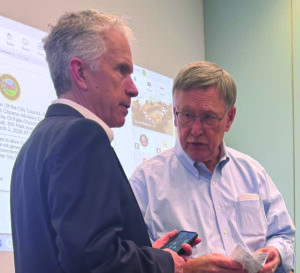Two contradictory forces collided in the late 1960s – the civil rights movement and the “sexual freedom” movement – and the latter won. Gay liberation soon adopted the trappings of the right-wing inspired “counterculture,” while seemingly magically in inner cities, doors opened wide to welcome virtually any kind of hedonistic excess.
In addition to sinister right-wing political and intelligence operations, monied interests who stood to gain fabulously from all the new nightclubs, bars, bathhouses, sex clubs, porn industries, the sex trade and more got their grip on the movement. Philosophers of hedonistic excess filled gay publications with calls to act out social anger with wanton, impersonal sex. Not love, sex.
Anyone who counseled restraint, or even romance, was denounced as counter-revolutionary and “sex negative.” It was no longer a matter of enfranchising homosexuals, as by 1971 it became fashionable on college campuses to be drugged and gay. What had been marginal in inner city underworlds – drugs, prostitution, porn and impersonal sex in public bathhouses, tea rooms, parks and sex clubs – became mainstream.
The June 1969 Stonewall riots, not the first involving clashes between police and gay street people (for example, the August 1966 Compton’s Cafeteria riot in San Francisco), occurred at the same time as, nearby, long lines were waiting to see Mart Crowley’s huge hit play, “The Boys in the Band.”
That play, which began a run of 1,000 performances in January 1968, marked a high point in the civil rights-inspired current of the gay movement.
It was the first of its kind to present the urban homosexual lifestyle to general audiences, and was wildly popular among gays and straights, alike. Unlike the tsunami of “sexual freedom” that later took over the movement, it was about two abiding themes: the struggle for genuine self-esteem, and the notion of a gay community.
Contrary to those who’ve trashed “The Boys in the Band” from the standpoint of subsequent, disingenuous post-modern hedonism, the play was not primarily about pre-liberation self-loathing. It was grounded in compassionate truth-telling, in the manner of Tennessee Williams, resonating with authenticity for gay audiences, while holding out for a far better day.
While recited as a taunt by Harold, it was actually important and liberating when the play’s character told Michael, “You are a sad and pathetic man. You’re a homosexual and you don’t want to be. But there is nothing you can do to change it. Not all our prayers to God, not all the analysis you can buy in all the years you’ve got left to live. You may very well one day be able to know a heterosexual life if you want it desperately enough – if you pursue it with the fervor with which you now annihilate – but you will always be homosexual as well. Always, Michael. Always. Until the day you die.”
That “affirmation” was, to me in that era, far more a clarion call to “come out” and to own my identity and integrity than any riot or lure of hedonistic excess.
All that was missing in the lives of the characters of that play, all that was needed for their liberation, was to have them, and the wider world, understand and accept the meaning of that small speech.
And finally, after all the cat fighting and drama, Harold departs by saying simply, “Call you tomorrow.” The bonds in this microcosm of our wider homosexual tribe could not have been stronger, despite everything.
For a young gay man, this play made the prospect of my life as an open, and not self-loathing, homosexual not only tolerable, but expectant.
It helped me to resolve, as Christopher Isherwood wrote about himself in Christopher and His Kind (1976), “He must never again give way to embarrassment, never deny the rights of his tribe, never apologize for its existence, never think of sacrificing himself masochistically on the altar of that false god of the totalitarians, the Greatest Good for the Greater Number – whose priests are alone empowered to decide what ‘good’ is.”
The play’s characters were employed and aspiring, the way most homosexuals were who came to the big city to pursue their often enormous talents. They’d not “turned on, tuned in and dropped out,” as the “counterculture” soon after demanded as a central tenant of the movement.
Like the play’s characters, I pursued a creative career after graduate seminary, as a journalist for a weekly alternative paper, the famous Berkeley Barb. I was a leading writer and focused on gay issues.
But by 1971 working for the Barb as a gay activist did not met with my radical counterculture gay colleagues’ favor. An entourage showed up at the Barb and, in publisher Max Scherr’s presence, demanded I quit and join them in the ranks of the unemployed, to live off welfare checks (“Aid to the Totally Disabled,” to be exact) and food stamps. I didn’t.
To be continued.













